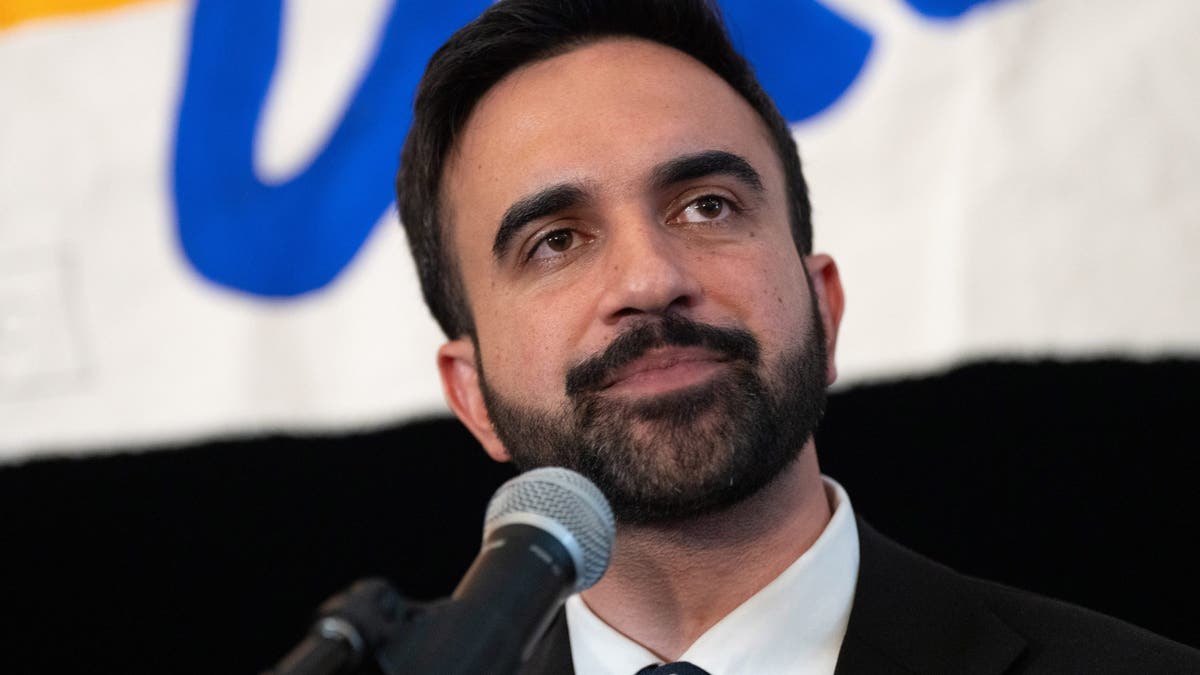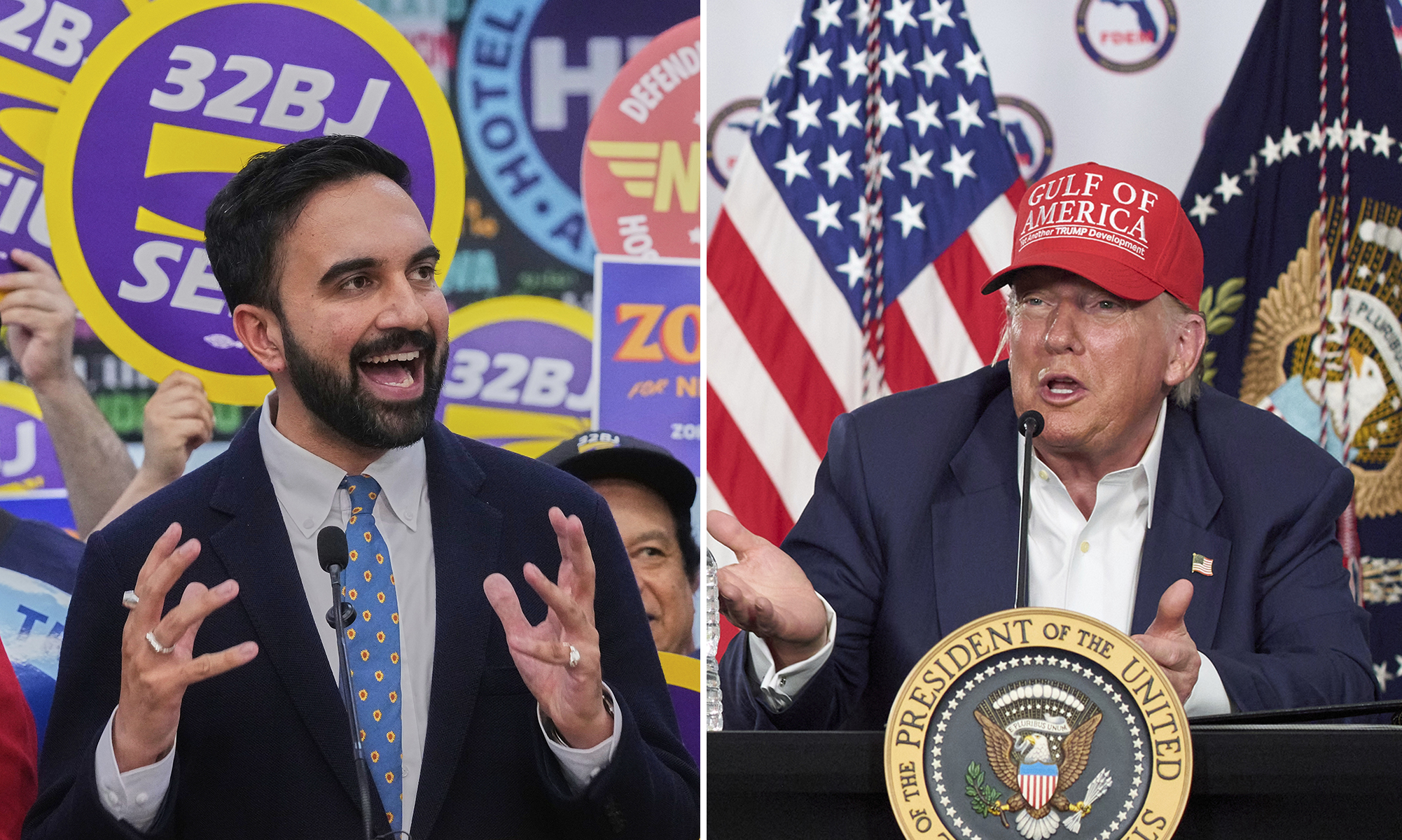President Donald Trump unleashed a fiery critique of New York City mayoral candidate Zohran Mamdani on Wednesday, branding the Democratic socialist a “Communist Lunatic” and pledging to wield federal authority to prevent what he perceives as the city’s potential decline under Mamdani’s leadership.
In a post on X, Trump declared his intent to “save” New York City, promising to restore its vibrancy and prominence, drawing parallels to his vision for the nation.
The provocative rhetoric, coupled with threats to scrutinize Mamdani’s legal status and counter his policies on immigration enforcement, underscores the high stakes surrounding the upcoming mayoral election and its implications for the nation’s largest city.
Trump’s comments reflect growing unease among Republicans and some moderates about Mamdani’s meteoric rise from a relatively obscure state assemblyman to the Democratic nominee for mayor, a position that holds significant influence over New York City’s policies and direction.
At 33, Mamdani’s victory in the June Democratic primary has sent shockwaves through the political landscape, positioning him as a symbol of a broader shift toward progressive, socialist ideals in urban governance.
His campaign’s bold proposals, particularly on property tax reform and housing equity, have sparked both enthusiasm and controversy, drawing sharp criticism from opponents who view his agenda as divisive and economically risky.
At the heart of Mamdani’s platform is a commitment to addressing systemic inequities in New York City’s housing and tax systems, which he argues disproportionately burden low-income and minority communities.
His campaign’s policy document, “Relieving the Burden on NYC Homeowners,” outlines a transformative approach to property taxation, asserting that the current system favors wealthy, predominantly White homeowners in affluent areas like Manhattan and parts of Brooklyn.

According to the proposal, outdated assessment caps allow these homeowners to pay significantly less in property taxes relative to the value of their homes, while residents in outer boroughs, such as Brownsville and Jamaica, face higher tax burdens and greater risks of foreclosure.
Mamdani’s solution is a sweeping overhaul of the property tax system, designed to redistribute the tax burden more equitably. The plan calls for reducing the taxable share of assessed property values across the city while increasing tax rates in wealthier neighborhoods, which the campaign describes as “richer and whiter.”
This approach aims to lower tax bills for low-income homeowners in underserved areas while requiring more affluent residents to contribute a fairer share. The proposal has drawn sharp criticism from opponents, who argue that it unfairly targets certain communities and could discourage investment in the city’s real estate market.
Beyond tax reform, Mamdani’s campaign addresses other housing-related challenges, including issues of deed theft and “tangled titles,” where individuals, often in Black and Latino communities, reside in homes they believe they own but lack legal documentation due to inheritance or other complications.
The campaign cites data indicating that these issues disproportionately affect minority neighborhoods, creating vulnerabilities to predatory practices. To address this, Mamdani proposes establishing a $10 million “Tangled Title Fund” to provide legal assistance to residents, enabling them to secure clear titles and full ownership rights.
As a member of the Democratic Socialists of America, Mamdani frames his policies within a broader critique of systemic racism and economic inequality. His campaign’s preamble articulates a vision to dismantle “white supremacy and racial oppression,” arguing that such efforts benefit all workers, including those in White communities.
This ideological stance has fueled both support and backlash, with supporters praising his commitment to equity and critics accusing him of promoting divisive rhetoric.
Mamdani’s housing agenda extends beyond tax reform to include ambitious plans for expanding affordable housing and protecting renters. He proposes constructing 200,000 new publicly funded affordable housing units and implementing multi-year rent controls for the city’s 2.4 million rent-stabilized tenants.

Additionally, he advocates for an immediate rent freeze to provide relief to renters facing rising costs. Critics warn that these measures could strain the city’s rental market, potentially discouraging private development and exacerbating housing shortages.
Another focal point of Mamdani’s campaign is his pledge to abolish the city’s tax lien auction system, which he describes as exploitative and discriminatory.
Under this system, when homeowners fall behind on property taxes, the city sells the debt to private investors, often at a discount, allowing them to pursue aggressive collection tactics.
Mamdani argues that this disproportionately harms low-income and minority homeowners, pushing them toward foreclosure. On his first day in office, he vows to replace this system with a new tax-collection framework that offers homeowners flexible payment plans and opportunities to remain in their homes.
President Trump’s outspoken criticism of Mamdani reflects broader Republican concerns about the rise of progressive figures in major cities. His X post not only attacked Mamdani’s ideology but also hinted at using federal powers to intervene in New York City’s governance, potentially through immigration enforcement or other mechanisms.
Trump’s reference to “holding all the levers” suggests a willingness to leverage federal authority to influence local policies, a move that could test the boundaries of federal-state relations.
The mention of Immigration and Customs Enforcement (ICE) raids is particularly significant, as Mamdani has advocated for policies that limit cooperation with federal immigration authorities, aligning with New York City’s status as a sanctuary city.
Trump’s threat to investigate Mamdani’s legal status—a provocative jab with no clear basis—further escalates the rhetoric, framing the mayoral race as a battleground for national political debates.

Mamdani’s rise has also sparked unease among moderate Democrats, who worry that his socialist platform could alienate centrist voters and jeopardize the party’s broader electoral prospects.
His victory in the Democratic primary, a testament to the growing influence of progressive activism, has amplified these concerns, particularly as New York City grapples with economic recovery, crime, and housing challenges in the post-pandemic era.
The clash between Trump and Mamdani highlights the deepening divide between competing visions for America’s urban centers. For Trump and his supporters, Mamdani represents a radical departure from traditional governance, with policies they view as economically unsustainable and socially divisive.
For Mamdani’s base, his platform offers a bold response to longstanding inequities, prioritizing the needs of marginalized communities and challenging entrenched power structures.
The outcome of the mayoral election will have far-reaching consequences for New York City’s trajectory. If elected, Mamdani’s policies could reshape the city’s tax system, housing landscape, and approach to social equity, potentially serving as a model for other progressive-led cities.
However, opponents warn that his proposals risk alienating business interests, driving away wealthy residents, and straining the city’s budget at a time of economic uncertainty.
On a national level, Trump’s intervention in the mayoral race underscores the intersection of local and federal politics. His willingness to comment on a municipal election signals the strategic importance of New York City as a symbol of Democratic governance and a testing ground for progressive policies.
The rhetoric also reflects a broader Republican strategy to frame Democratic candidates as extreme, particularly those associated with socialist or progressive movements.
As the November election approaches, Mamdani faces the challenge of translating his primary victory into a broader coalition that can secure the mayoralty. His ability to address concerns about the feasibility of his proposals—particularly the economic impact of tax reform and rent controls—will be critical to winning over skeptical voters.
At the same time, his campaign’s focus on equity and systemic change resonates with a growing segment of the electorate, particularly younger and minority voters who feel disenfranchised by the status quo.
For Trump, the decision to weigh in on the race carries both risks and opportunities. While his comments may energize his base and amplify Republican opposition to Mamdani, they also risk alienating New Yorkers who view federal interference in local affairs as overreach.
The threat to target Mamdani personally could further polarize the electorate, framing the election as a referendum on national ideological battles rather than local governance.
The confrontation between President Trump and Zohran Mamdani encapsulates the high stakes of New York City’s mayoral race and its broader implications for American politics.
Mamdani’s transformative vision for housing, taxation, and social equity has positioned him as a polarizing figure, celebrated by progressives and vilified by conservatives.

Trump’s fiery rhetoric, meanwhile, underscores the national significance of the election, with New York City serving as a battleground for competing ideologies. As the campaign unfolds, the clash between these two figures will likely intensify, shaping the future of the city and its place in the national conversation.





